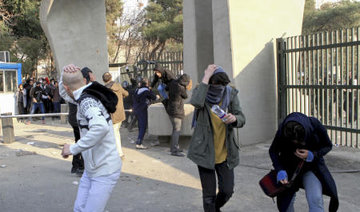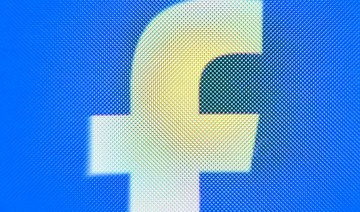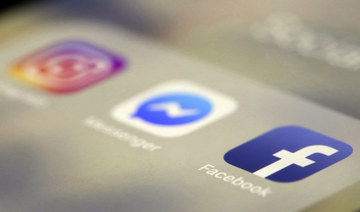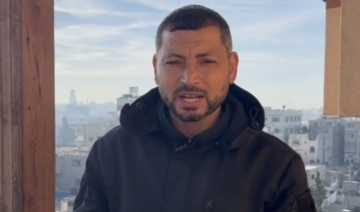DUBAI: Guns drawn, Iranian intelligence agents rushed into the apartment of a Washington Post reporter and his journalist wife in Tehran.
Threatening to kill Jason Rezaian in front of his wife, Yeganeh, the 20 agents in the July 2014 raid tore through their belongings and rifled through drawers, clothes and valuables for an hour.
But perhaps their most eagerly sought target was not exactly inside the house: They forced the couple to hand over the passwords to their email and social media profiles.
That raid demonstrated how much of a threat Iran’s theocratic government sees in the Internet. It has long sought to strictly control cyberspace and social media — and, thereby, the flow of information to the public.
But the country’s relationship with the world wide web is far more complicated than simple repression. Over the past four years, authorities have encouraged wider use of the Internet among Iranians, hoping to generate the benefits of a more modern economy. As a result, nearly half the population have in their pockets a tool that the state is struggling to constrain: smartphones, with cameras and Internet links that let anyone broadcast to the world.
Those smartphones helped spread the startling burst of protests across Iran that opened 2018. The government succeeded in suffocating the flare-up in part by shutting off key social media and messaging apps, but the lesson was clear: The same oxygen that can resuscitate commerce can also give breath to potential revolt.
Authorities’ solution has been to create a so-called “halal net,” Iran’s own locally controlled version of the Internet aimed at restricting what the public can see.
As Iran approaches the 40th anniversary of the revolution that brought its cleric-led rule to power, how it handles the power of cyberspace will be crucial to its future, determining whether it moves to greater openness or seals itself off from the world.
“The Islamic Republic is not black and white. It shows a myriad of contradictions and its Internet policy I think is one of the great examples of those contradictions,” said Sanam Vakil, an associate fellow at Chatham House who studies Iran. “The government has taken the Internet and effectively used it for its own purposes and also has realized the dangers of it as well.”
Since the 1979 Revolution, how information spreads across mass media has been tightly controlled.
All television and radio broadcasts within Iran are from state-run stations. Satellite dishes remain ostensibly illegal, though they are plentiful, drawing occasional attacks from bat-wielding government enforcers. Journalists face restrictions in what they can cover and where they can travel across a country of 80 million people that is nearly two-and-a-half times the size of Texas.
The Internet helped collapse that distance. During Iran’s 2009 protests surrounding the disputed re-election of hard-line President Mahmoud Ahmadinejad, still nascent social media spread word of the events among Iranians and brought videos of the shooting death of 26-year-old Neda Agha Soltan to the world.
Iran’s government, overseen by Supreme Leader Ayatollah Ali Khamenei, violently suppressed the demonstrations. The crackdown killed dozens and saw thousands imprisoned, with some tortured by their jailers.
Even before the 2009 protests, Iran blocked access to YouTube. Twitter and Facebook followed amid the unrest, as did many other sites later. Some in Iran began using virtual private networks, or VPNs, which allow users to bypass government censorship.
The chief difference between then and the protests that rocked the country coming into 2018 was the massive proliferation of smartphones. As recently as 2014, only an estimated 2 million Iranians possessed one. Today, estimates suggest Iranians own 48 million.
That explosive growth was spurred by the administration of President Hasan Rouhani. His officials allowed more mobile phone service providers to offer 3G and 4G Internet, suddenly making sharing photos and images possible. Home Internet connections became faster. The encrypted messaging platform Telegram spread like wildfire. Over 40 million Iranians are estimated to use it, for everything from benign conversations to commerce and political campaigning.
In the recent unrest, protesters used Telegram’s mass-messaging channels to share information and videos across 75 cities and towns where demonstrations erupted. Some showed people openly in the streets shouting, “Death to Khamenei!” It shocked many, especially as such cries could bring a death sentence.
In Iran, a ‘halal’ Internet means more control after unrest
In Iran, a ‘halal’ Internet means more control after unrest
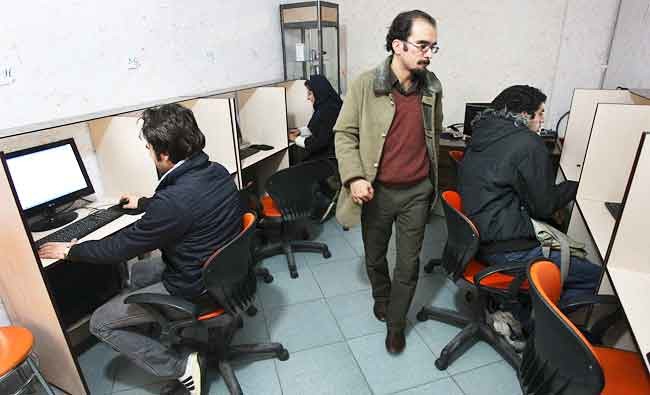
Russia charges journalist with ‘justifying terrorism’
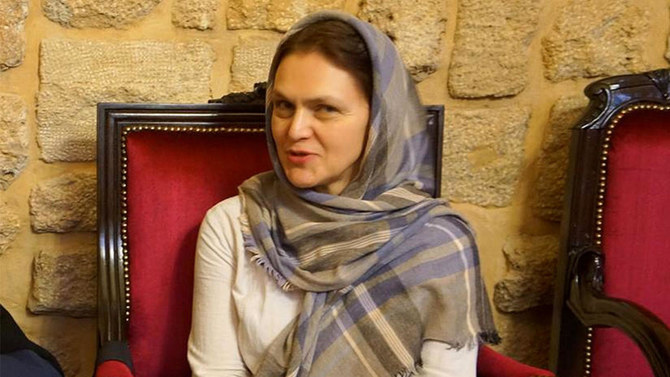
- Nadezhda Kevorkova was arrested for two Telegram posts regarding an Islamist raid and Afghanistan, her son reports
- The journalist specialized in coverage of the Middle East
Kevorkova, 65, wrote for a number of outlets including Novaya Gazeta and Russia Today and specialized in coverage of the Middle East, including the Israeli-Palestinian conflict.
“Nadezhda Kevorkova has been detained and will be taken to a temporary detention center today. The matter of pre-trial restrictions will be decided tomorrow,” lawyer Kaloy Akhilgov said.
The charges relate to two posts on her Telegram from 2018 and 2021, one a re-post from another journalist about the 2005 Islamist raid on Nalchik and the other about Afghanistan, he said.
The raid on Nalchik, a city in Russia’s North Caucasus, saw armed Islamist militants target government and security buildings in an attack that left dozens of people dead.
Her ex-husband Maxim Shevchenko, who presents a talk show on state television, rejected the charges against her.
“Nadezhda Kevorkova never justified terrorism and never justified the attack on Nalchik ... but as a journalist, she certainly wrote about torture during the investigation,” he said.
Russia has waged an unprecedented crackdown on freedom of the press since launching its full-scale offensive in Ukraine, silencing and detaining journalists at odds with the Kremlin.
Media watchdogs raise alarm over Al Jazeera ban, call for it to be lifted

- Israel’s decision sets ‘dangerous precedent,’ Committee to Protect Journalists says
- News channel vows to continue Gaza coverage, will pursue ‘every legal step’ to fight block
LONDON: Media watchdogs have condemned Israel’s decision to block Al Jazeera, raising concerns about the erosion of media freedom in the country, especially amid the ongoing conflict in Gaza.
The US-based Committee to Protect Journalists said the government’s decision set a dangerous precedent for other international media outlets operating in Israel.
“CPJ condemns the closure of Al Jazeera’s office in Israel and the blocking of the channel’s websites,” program director Carlos Martinez de la Serna said in New York.
Israel should allow Al Jazeera and all international media outlets to operate freely, particularly during wartime, he said.
The Committee to Protect Journalists condemns the Israeli cabinet’s decision to shut down Al-Jazeera’s operations in Israel and warns that the vote could set a dangerous precedent for other international media outlets working in Israel. Our statement:https://t.co/X4wQEsYl1b
— Committee to Protect Journalists (@pressfreedom) May 5, 2024
Israel’s executive authority voted on Sunday to pass a law allowing the temporary shutdown of a foreign channel’s broadcasts if the content was deemed to be a threat to security during the ongoing war.
Soon after Prime Minister Benjamin Netanyahu announced the decision, reports emerged of raids on the offices of the Qatar-backed broadcaster.
The Foreign Press Association released a statement condemning the decision as a “dark day for the media” and accused Israel of joining “a dubious club of authoritarian governments” by banning the broadcasts.
The UN’s Human Rights office also urged the Israeli government to reverse the ban
“A free & independent media is essential to ensuring transparency & accountability. Now, even more so given tight restrictions on reporting from Gaza,” it said on X.
We regret cabinet decision to close Al Jazeera in Israel. A free & independent media is essential to ensuring transparency & accountability. Now, even more so given tight restrictions on reporting from Gaza. Freedom of expression is a key human right. We urge govt to overturn ban
— UN Human Rights (@UNHumanRights) May 5, 2024
There has also been criticism of the decision from within the country, with the Association for Civil Rights in Israel filing a request to the Supreme Court to overturn the ban.
The news came amid a yearslong campaign waged against Al Jazeera by the Israeli government, which accuses it of anti-Israeli bias and “being a mouthpiece for Hamas.”
The broadcaster rejected the claims and said it would “pursue every legal step” to fight the decision.
Al Jazeera also vowed to continue its coverage from Gaza, as it remains one of the few networks with a strong presence on the ground, as foreign journalists are banned from entering the Strip without Israeli army supervision.
The network accused Israel of deliberately targeting its staff in an attempt to silence them.
“Israel’s suppression of free press to cover up its crimes by killing and arresting journalists has not deterred us from performing our duty,” it said in its response to Sunday’s ban.
Despite the ruling, the channel remains accessible through Facebook in Israel.
‘Everybody is vulnerable’: Fake US school audio stokes AI alarm

- The clip, which left administrators of Pikesville High School fielding a flood of angry calls and threats, underscores the ease with which widely available AI and editing tools can be misused to impersonate celebrities and everyday citizens alike
WASHINGTON: A fabricated audio clip of a US high school principal prompted a torrent of outrage, leaving him battling allegations of racism and anti-Semitism in a case that has sparked new alarm about AI manipulation.
Police charged a disgruntled staff member at the Maryland school with manufacturing the recording that surfaced in January — purportedly of principal Eric Eiswert ranting against Jews and “ungrateful Black kids” — using artificial intelligence.
The clip, which left administrators of Pikesville High School fielding a flood of angry calls and threats, underscores the ease with which widely available AI and editing tools can be misused to impersonate celebrities and everyday citizens alike.
In a year of major elections globally, including in the United States, the episode also demonstrates the perils of realistic deepfakes as the law plays catch-up.
“You need one image to put a person into a video, you need 30 seconds of audio to clone somebody’s voice,” Hany Farid, a digital forensics expert at the University of California, Berkeley, told AFP.
“There’s almost nothing you can do unless you hide under a rock.
“The threat vector has gone from the Joe Bidens and the Taylor Swifts of the world to high school principals, 15-year-olds, reporters, lawyers, bosses, grandmothers. Everybody is now vulnerable.”
After the official probe, the school’s athletic director, Dazhon Darien, 31, was arrested late last month over the clip.
Charging documents say staffers at Pikesville High School felt unsafe after the audio emerged. Teachers worried the campus was bugged with recording devices while abusive messages lit up Eiswert’s social media.
The “world would be a better place if you were on the other side of the dirt,” one X user wrote to Eiswert.
Eiswert, who did not respond to AFP’s request for comment, was placed on leave by the school and needed security at his home.
When the recording hit social media in January, boosted by a popular Instagram account whose posts drew thousands of comments, the crisis thrust the school into the national spotlight.
The audio was amplified by activist DeRay McKesson, who demanded Eiswert’s firing to his nearly one million followers on X. When the charges surfaced, he conceded he had been fooled.
“I continue to be concerned about the damage these actions have caused,” said Billy Burke, executive director of the union representing Eiswert, referring to the recording.
The manipulation comes as multiple US schools have struggled to contain AI-enabled deepfake pornography, leading to harassment of students amid a lack of federal legislation.
Scott Shellenberger, the Baltimore County state’s attorney, said in a press conference the Pikesville incident highlights the need to “bring the law up to date with the technology.”
His office is prosecuting Darien on four charges, including disturbing school activities.
Investigators tied the audio to the athletic director in part by connecting him to the email address that initially distributed it.
Police say the alleged smear-job came in retaliation for a probe Eiswert opened in December into whether Darien authorized an illegitimate payment to a coach who was also his roommate.
Darien made searches for AI tools via the school’s network before the audio came out, and he had been using “large language models,” according to the charging documents.
A University of Colorado professor who analyzed the audio for police concluded it “contained traces of AI-generated content with human editing after the fact.”
Investigators also consulted Farid, writing that the California expert found it was “manipulated, and multiple recordings were spliced together using unknown software.”
AI-generated content — and particularly audio, which experts say is particularly difficult to spot — sparked national alarm in January when a fake robocall posing as Biden urged New Hampshire residents not to vote in the state’s primary.
“It impacts everything from entire economies, to democracies, to the high school principal,” Farid said of the technology’s misuse.
Eiswert’s case has been a wake-up call in Pikesville, revealing how disinformation can roil even “a very tight-knit community,” said Parker Bratton, the school’s golf coach.
“There’s one president. There’s a million principals. People are like: ‘What does this mean for me? What are the potential consequences for me when someone just decides they want to end my career?’“
“We’re never going to be able to escape this story.”
Lawsuit against Meta asks if Facebook users have right to control their feeds using external tools

- The tool, called Unfollow Everything 2.0, is a browser extension that would let Facebook users unfollow friends, groups and pages and empty their newsfeed — the stream of posts, photos and videos that can keep them scrolling endlessly
Do social media users have the right to control what they see — or don’t see — on their feeds?
A lawsuit filed against Facebook parent Meta Platforms Inc. is arguing that a federal law often used to shield Internet companies from liability also allows people to use external tools to take control of their feed — even if that means shutting it off entirely.
The Knight First Amendment Institute at Columbia University filed a lawsuit Wednesday against Meta Platforms on behalf of an Amherst professor who wants to release a tool that enables users to unfollow all the content fed to them by Facebook’s algorithm.
The tool, called Unfollow Everything 2.0, is a browser extension that would let Facebook users unfollow friends, groups and pages and empty their newsfeed — the stream of posts, photos and videos that can keep them scrolling endlessly. The idea is that without this constant, addicting stream of content, people might use it less. If the past is any indication, Meta will not be keen on the idea.
A UK developer, Louis Barclay, released a similar tool, called Unfollow Everything, but he took it down in 2021, fearing a lawsuit after receiving a cease-and-desist letter and a lifetime Facebook ban from Meta, then called Facebook Inc.
With Wednesday’s lawsuit, Ethan Zuckerman, a professor at the University of Massachusetts at Amherst, is trying to beat Meta to the legal punch to avoid getting sued by the social media giant over the browser extension.
“The reason it’s worth challenging Facebook on this is that right now we have very little control as users over how we use these networks,” Zuckerman said in an interview. “We basically get whatever controls Facebook wants. And that’s actually pretty different from how the Internet has worked historically.” Just think of email, which lets people use different email clients, or different web browsers, or anti-tracking software for people who don’t want to be tracked.
Meta declined to comment.
The lawsuit filed in federal court in California centers on a provision of Section 230 of the 1996 Communications Decency Act, which is often used to protect Internet companies from liability for things posted on their sites. A separate clause, though, provides immunity to software developers who create tools that “filter, screen, allow, or disallow content that the provider or user considers to be obscene, lewd, lascivious, filthy, excessively violent, harassing, or otherwise objectionable.”
The lawsuit, in other words, asks the court to determine whether Facebook users’ news feed falls into the category of objectionable material that they should be able to filter out in order to enjoy the platform.
“Maybe CDA 230 provides us with this right to build tools to make your experience of Facebook or other social networks better and to give you more control over them,” said Zuckerman, who teaches public policy, communication and information at Amherst. “And you know what? If we’re able to establish that, that could really open up a new sphere of research and a new sphere of development. You might see people starting to build tools to make social networks work better for us.”
While Facebook does allow users to manually unfollow everything, the process can be cumbersome with hundreds or even thousands of friends, groups and businesses that people often follow.
Zuckerman also wants to study how turning off the news feed affects people’s experience on Facebook. Users would have to agree to take part in the study — using the browser tool does not automatically enroll participants.
“Social media companies can design their products as they want to, but users have the right to control their experience on social media platforms, including by blocking content they consider to be harmful,” said Ramya Krishnan, senior staff attorney at the Knight Institute. “Users don’t have to accept Facebook as it’s given to them. The same statute that immunizes Meta from liability for the speech of its users gives users the right to decide what they see on the platform.”
Netanyahu’s Cabinet votes to permanently close Al Jazeera offices in Israel
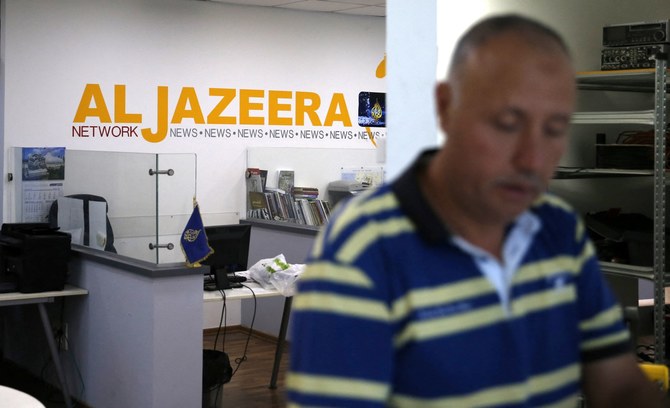
- Vote comes amid deeply strained ties between Israel and the channel, which have worsened during the war against Hamas
TEL AVIV: Israeli Prime Minister Benjamin Netanyahu said on Sunday that his government has voted unanimously to shutter the offices of the Qatar-owned broadcaster Al Jazeera in Israel.
Netanyahu announced the decision on X, formerly Twitter. Details on when it would go into effect or whether it was permanent or temporary were not immediately clear.
The vote comes amid deeply strained ties between Israel and the channel, which have worsened during the war against Hamas.
It also comes as Qatar is helping to broker a cease-fire agreement between Israel and Hamas in the war in Gaza.



